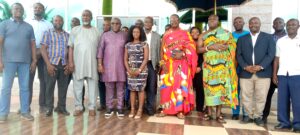GHEITI introduces Beneficial Ownership addresses for transparency
 The Ghana Extractive Industry Transparency Initiative (GHEITI) says enough progress has been made in tackling the issues of obscure licensing procedures and concealed ownership.
The Ghana Extractive Industry Transparency Initiative (GHEITI) says enough progress has been made in tackling the issues of obscure licensing procedures and concealed ownership.
Dr Steve Manteaw, the Co-Chair of the GHEITI, at a dissemination workshop, highlighted the significant progress that was made in promoting transparency and accountability within the extractive industry, leading to solving the longstanding concern of opaque licensing procedures.
The workshop was part of the 2020 Ghana EITI reports on the mining, oil, and gas sectors held at New Abirem in the Birim North district of the Eastern region.
In 2019, the government, through the Office of Registrar of Companies (ORC), and Parliament passed a new Companies Act (Act 992) that mandated the ORC to establish a central register for the collection of Beneficial Ownership (BO) information.
Dr Manteaw said the transformative impact of the introduction of BO measures had successfully addressed long standing concerns about obscure procedures.
This development marks the dawn of a new era characterised by enhanced transparency and accountability in the country’s extractive sector.
The term “beneficial owner” pertains to an influential figure who possesses considerable financial stakes or authority within a company.
Its reporting obligations aim to combat unlawful financial activities such as illicit money transfers, transfer pricing, and under-invoicing within the extractive industry.
The intervention of Ghana ETTI in advocating for fiscal reforms, especially royalties in the extractive sector, had yielded savings of about $713 million.
Dr Manteaw expressed his commitment to the transparency initiative, stating that it would persistently strive to deliver timely updates on company payments and government receipts from the mining and oil/gas sectors.
The aim is to ensure that this information is easily accessible, inclusive, and presented in a straightforward manner, ultimately reaching a wider population.
Ghana boasts an impressive array of five essential minerals, each varying in abundance.
These minerals, namely manganese, bauxite and aluminum, iron ore, silica sand, and lithium, hold immense potential for propelling the nation towards becoming an industrial hub in both Africa and Europe.
The EITI has emerged as a prominent global benchmark, evaluating the governance practices of economies heavily reliant on natural resources.
It aims to assess how effectively these countries manage their resource wealth, ensuring transparency and accountability processes.
Ghana joined the initiative in 2013 and had diligently contributed to the cause by generating a remarkable total of 19 mining reports and nine oil and gas reports.
Mr Seth Kwame Acheampong, the Eastern Regional Minister, emphasised the immense significance of the minerals sector in bolstering Ghana’s economy.
Recognising the extractive industry’s pivotal role, he underlined its crucial contribution to the country’s ambitious industrialization agenda.
Mr Kwaku Boa-Amponsem, Consultant to GHEITI, presented the 2020 report on the mining, oil, and gas sectors.
Source: GNA
